#Annika Saarikko
Photo

Their story made history.
#First Five#Viisi valittua#Sanna Marin#Anna-Maja Henriksson#Li Andersson#Annika Saarikko#Maria Ohisalo#Max Original#HBO Max#Finland
6 notes
·
View notes
Text
I’m sure everyone’s a bit Davos’d out, but as I read the WEF and Ukraine news this week, I couldn’t help but connect the WEF ideology to Europe’s self-immolation. It’s also interesting to contrast WEF ideas for societal organization to those laid out in today’s piece from Linda M. Nicholas and Gary M. Feinman who argue what made the ancient city Monte Albán so long-lasting and broadly successful was its relative equality in lifestyle, its collective action, and localized economic production.
A commonly asked question ever since NATO’s war against Russia in Ukraine really kicked off last February is why on earth would Europe go along with the American neocons in their policies that are driving Europe towards deindustrialization and a long-lasting energy crisis while the US reaps the rewards in LNG exports.? After all, these are some of the same countries that said no to Iraq and watched Washington bungle that job, as well as Afghanistan and its regime change efforts in Syria. From Wolfgang Streeck:
This makes it all the more amazing that European countries should, apparently without any debate, have so completely left the handling of Ukraine to the United States. In effect, this represents a principal turning the management of his vital interests over to an agent with a recent public record of incompetence and irresponsibility.
Could European leaders not see that the Ukrainian proxy war plan was a shortsighted one that would decimate their economies? Politico reported the following last week:
At their final summit of 2022 in December, EU leaders insisted they had heard the call. The meeting produced an instruction to the European Commission to rapidly draw up proposals “with a view to mobilizing all relevant national and EU tools” to address the dual energy and competitiveness crises hitting European industry. The issue is due to dominate an EU leaders’ summit scheduled for February 9-10.
Did it truly take European leaders 10 months to come to grips with this fact? Or is it possible that they simply not care? Davos is a reminder of these leaders’ vision of the world, which is encapsulated by the WEF and its idea of a trans-national capitalist elite. National industry is an outdated concept to them, and Russia represents an existential threat to their ideology of oligarchic rule. The WEF essentially acts as a capitalist and war consulting firm and a gigantic lobby. Diana Johnstone, former press secretary of the Green Group in the European Parliament, writes:
[The WEF] is powerful today because it is operating in an environment of State Capitalism, where the role of the State has been largely reduced to responding positively to the demands of such lobbies, especially the financial sector. Immunized by campaign donations from the obscure wishes of ordinary people, most of today’s politicians practically need the guidance of lobbies such as the WEF to tell them what to do.
On top of such guidance, the WEF Young Global Leaders program helps spread this slime throughout the European halls of power. Here’s a list of those I could find who are currently in European government or other notable positions, and there are no doubt many more:
Alexander De Croo, prime minister of Belgium
Emmanuel Macron, president of France
Sanna Marin, the Finnish prime minister
Annika Saarikko, FInland minister of finance
Annalena Baerbock, German foreign minister
Amélie de Montchalin, French minister for the environmental transition and territorial cohesion
Tomas Pojar, Czech foreign minister
Virginijus Sinkevičius, European commissioner for the environment
Eva Maydell, member of the European Parliament from Belgium; her big priority is pushing a digital single market
Leo Varadkar, the Irish Taoiseach
Lea Wermelin, Danish Minister for the Environment
Greek Prime Minister Kyriakos Mitsotakis was only nominated for a WEF global leader of tomorrow spot, but he’s been trying to prove his worth ever since.
Chrystia Freeland, she’s deputy prime minister of Canada, but included here because of her synergy with Victoria Nuland and her fascist goals abroad, especially in Ukraine
Kalin Anev Janse is the Chief Financial Officer and Member of the Management Board of the European Stability Mechanism, which works to force austerity and privatization onto eurozone countries.
Klaus Regling, who was head of the European Stability Mechanism from its inception in 2012 until last year.
Dr. Katarzyna Pisarska, the Founder and Director of the Visegrad School of Political Studies, which brings together young politicians, civil society activists, journalists and civil servants from the countries of the Visegrád Group. You might know the Visegrad Group from its Twitter account Visegrad24 that celebrates certain elements of Ukraine’s military:
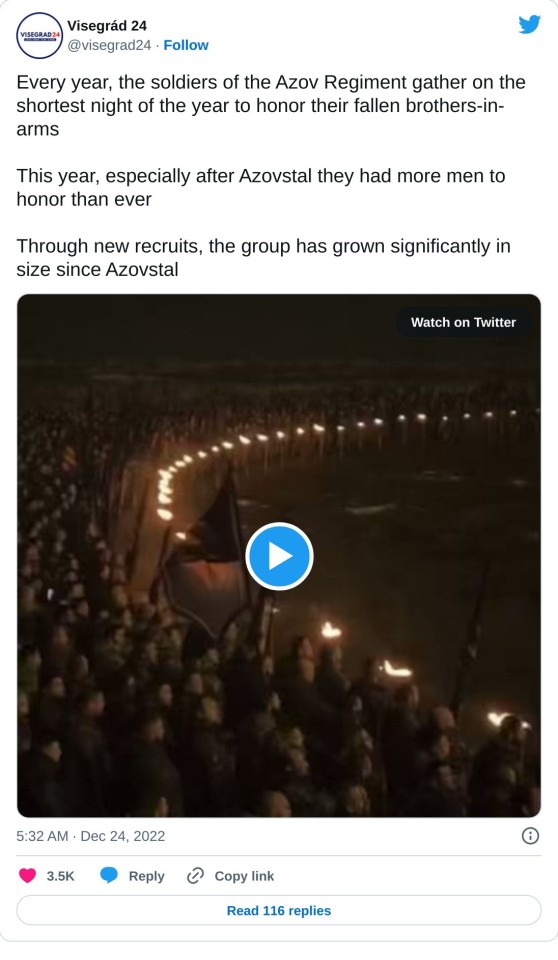
And there are hundreds more young global leaders in finance, NGOs, media, academia, and lower levels of government, almost all of them working hand in glove to realize their common beliefs that are generally neoliberal, corporatist, undemocratic, and exhibit a disdain for the working class. Do these “global leaders” really care if what’s left of their countries’ industry needs to be relocated to the US or elsewhere? After all, to them national sovereignty is outdated. As Thomas Fazi writes at Unherd:
Samuel Huntington, who is credited with inventing the term “Davos man”, argued that members of this global elite “have little need for national loyalty, view national boundaries as obstacles that thankfully are vanishing, and see national governments as residues from the past whose only useful function is to facilitate the elite’s global operations”.
The “Davos man” also believes that the working class will soon be replaced by Artificial Intelligence. He has been outsourcing jobs for years, and thinks further deindustrialization will help the green transition. Johnstone describes how the WEF-influenced Greens in Germany want to remake the country’s industry:
The Greens have not forgotten the environment, and see “climate neutrality” as the “great opportunity for Germany as an industrial location.” The development of “climate protection technologies” should “provide impetus for new investments.” Their program calls for creation of a “digital euro,” secure mobile “digital identities” and “digital administrative services.”
Indeed, the Green economic program sounds very much like the Great Reset advocated by the World Economic Forum at Davos, with a new economy centered on climate change, artificial intelligence and digitalization of everything.
Here is Young Global Leader and current German foreign minister from the Green Party Annalena Baebock explaining why she doesn’t listen to Germans’ concerns over job losses or freezing to death:
Vladimir Putin was also a WEF Young Global Leader. Here’s Klaus Schwab, the founder and executive chairman of the WEF and man with the plan to discard rule by the people in favor of rule by corporate interests, bragging that Putin was a member of his Young Global Leaders program:
youtube
They don’t advertise that so much anymore, as Putin became a traitor to the WEF cause. Russia was a major topic of discussion at this year’s Davos gathering, which was themed “cooperation in a fragmented world,” by which they mean the world is now fragmented due to Russia and China’s refusal to bend the knee. Both Moscow and Beijing represent an existential threat to the WEF ideology because as Michael Hudson has explained time and again, the true battle being waged is between financial oligarchy on behalf of the Davos crowd and a mixed public-private economy in places like Russia, China, and elsewhere in the global south.
The fragmentation of western societies was not on the agenda, but European polls clearly show a break.
In the EU Key Challenges of Our Times autumn poll, 70 percent of working class respondents believe the war in Ukraine has had serious financial consequences for them personally; only 49 percent of upper class respondents believe the same. Forty-five percent of working class respondents are satisfied with the EU involvement in Ukraine; 71 percent of the upper class is.
These numbers are remarkable when considering the unprecedented propaganda campaign in Europe. As Wolfgang Streeck puts it in New Left Review, in Germany any questioning of the war is silenced even as the threat of nuclear annihilation grows:
Those disposed to undertake a close reading of the public pronouncements of the governing coalition of the willing can recognize traces of debates going on behind the scenes, over how best to prevent the Great Unwashed getting in the way of what may be coming to them. On 21 September, one of the chief editors of FAZ, Berthold Kohler, a hardliner if there ever was one, noted that even among Western governments ‘the unthinkable is no longer considered impossible’. Rather than allowing themselves to be blackmailed, however, Western ‘statesmen’ have to muster ‘more courage… if the Ukrainians insist on liberating their entire country’, an insistence that we have no right to argue with. Any ‘arrangement with Russia at the expense of the Ukrainians’ would amount to ‘appeasement’ and ‘betray the West’s values and interests’, the two happily converging. To reassure those of his readers who would nevertheless rather live for their families than die for Sevastopol – and who had hitherto been told that the entity called ‘Putin’ is a genocidal madman entirely impervious to rational argument – Kohler reports that in Moscow there is sufficient fear of ‘the nuclear Armageddon in which Russia and its leaders would burn as well’ for the West to support to the hilt the Zelensky view of the Ukrainian national interest.
The peoples’ lack of support to “die for Sevastopol” is similar to their unwillingness to go along with plans to destroy their lives and enslave them to a techno-capitalist system of exploitation, which is perhaps why plans like this are being floated:
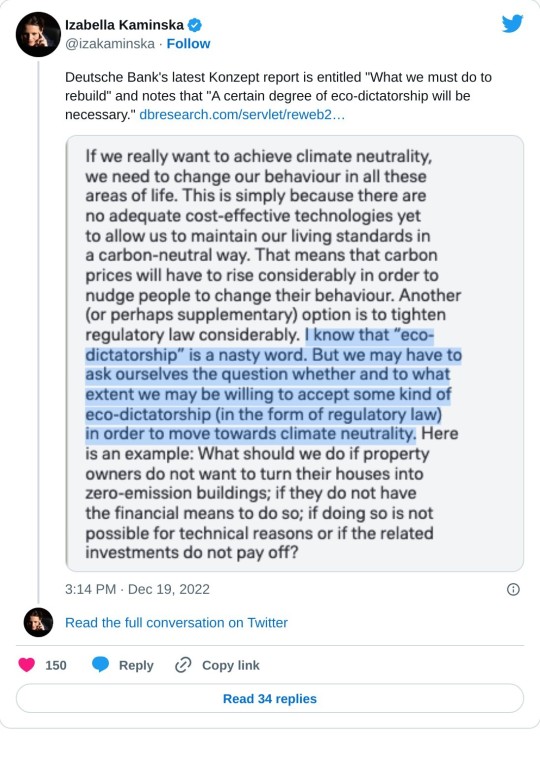
European polls show major divergence on labor issues, such as 52 percent of the working class rating fair working conditions as the most important to the EU’s social and economic development. Only 30 percent of the upper class feels the same way. And 66 percent of the EU working class feel their quality of life is getting worse; only 38 percent of the upper class feel the same way.
One need look no further for fragmentation between the WEF elite and working stiffs than Young Global Leader and French President Emmanuel Macron who is treated like royalty in Davos while back in France he’s faced nearly four years of gilets jaunes protests against his austerity and neoliberal policies, and some French can’t bear the sight of him:
youtube
And another:
youtube
They rolled out Henry Kissinger at Davos so he could tell the .001 percent they’ve been right all along about Ukraine, and they should now double down by rushing the country into NATO. The 99-year-old apparently wants to add to his 3-4 million body count before he kicks the bucket. As Spencer Ackerman writes:
The elite of the World Economic Forum consult one of the architects of today’s world to guide them out of the polycrisis he played a role in creating. And he inevitably reinforces the convictions of this same class, who most benefit from the way the world currently is, that they and they alone hold the keys to responsibly guiding the world out of the polycrisis. And if they further extract wealth from the wreckage of a polycrisis-wracked world, who’s to say there’s anything wrong with that? Certainly no one at Davos.
Even if these like-minded leaders lay waste to Europe, they probably think they can follow in the path of one of the WEF Young Leader trailblazers: former British Prime Minister and war criminal Tony Blair. After he left government he began “operating a dizzying, and often overlapping, web of charities, firms, and foundations that have catapulted him to the status of one of Britain’s wealthiest people.”
He travels around giving interviews warning against the dangers of populism and free public services – a task that is no doubt more difficult with Jeffrey Epstein’s “Lolita Express” no longer offering him free rides.
The problem is that before these people can cash in à la Blair, they just might get us all killed first. As Patrick Lawrence wrote at Consortium News after Angela Merkel’s (another WEF Global Leader for Tomorrow) revelations that the Minsk Accords were simply a ruse intended to buy time for Ukraine to prepare for war:
A measure of trust was essential between Washington and Moscow even during the Cold War’s most perilous passages. The Cuban Missile Crisis was resolved as it was because U.S. President John F. Kennedy and the Soviet premier, Nikita Khrushchev, were able sufficiently to trust one another. This trust no longer exists, as Putin and other Russian officials have made clear in responding to publication of the two German interviews.
Moscow and Beijing have said repeatedly since Joe Biden assumed office not quite two years ago that there is no trusting the Americans. The follow-on thought is that there is no point negotiating with them in a diplomatic context. For various Russian officials, from Putin on over and down, Merkel’s revelations seem grimly to have confirmed these conclusions.
It is a major turn that Moscow now includes the Europeans, and especially the Germans, in this assessment. Germany now tells the lies of which the American empire is made — a matter of anxiety and sadness all at once. If scorched-earth diplomacy is a fitting name for what the West has been up to in its dealings with Russia since 2014, as I think it is, the German bridge between West and East has been burnt.
The gravity of these conclusions, the implications as we face forward, are immense for the West and non–West alike. A world replete with hostilities is one we all know. A world devoid of trust and talking will prove another matter.
#world economic forum#davos#davos world economic forum#davos man#ukraine conflict#world war 3#WEF#Youtube
28 notes
·
View notes
Photo
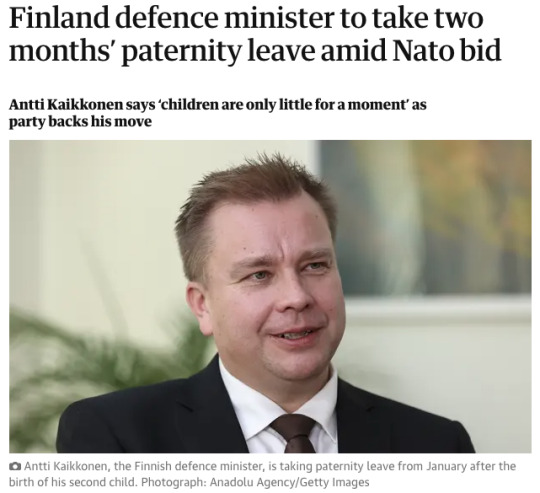
Read full article by The Guardian
Finland’s defence minister will take almost two months’ paternity leave early next year amid his country’s bid to join Nato, a move his Centre party praised.
“We proudly support Antti Kaikkonen’s decision,” the party leader and finance minister, Annika Saarikko, said. Kaikkonen will be off work from 6 January until the end of February.
“The opportunity to take and decide on family leave belongs to everyone,” Saarikko said.
In Finland, fathers whose children were born before September 2022 are entitled to 54 days paternity leave. About 80% of dads in Finland take some amount of paternity leave, the government said last year.
While several ministers have taken maternity leave during their stints in the current government, Kaikkonen is one of the first male ministers to go on paternity leave. In the late 1990s, the then-prime minister, Paavo Lipponen, took paternity leave in a groundbreaking move.
During Kaikkonen’s absence, he will be replaced by Centre MP Mikko Savola.
“Savola has long and wide experience and expertise in defence policy,” Kaikkonen said.
25 notes
·
View notes
Text
A poll published on Friday by farmer's union circular Maaseudun Tulevaisuus (siirryt toiseen palveluun) shows Minister for Foreign Affairs Pekka Haavisto (Green) as leader in the outlet's presidential poll.
Out of nearly 1,000 respondents, 17.3 percent said they supported Haavisto to succeed Sauli Niinistö at the next election in 2024. After two terms in office, Niinistö is constitutionally barred from running again.
Following Haavisto was the Centre Party's Olli Rehn, current Governor of the Bank of Finland, and Mika Aaltola, Director of the Finnish Institute of International Affairs.
Compared to the previous MT presidential poll in early July, Rehn in particular has lost popularity. In the summer, Rehn received 20 percent of the vote, but now his support is just under 14 percent.
Aaltola, who has not declared any possible candidacy, has been in the public spotlight this year because of his foreign policy expertise, making many television and media appearances. Since the last MT poll this summer, his support has risen from five to eight percent.
Haavisto's support remained unchanged at 17 percent. The Green League MP has previously run for president in 2012 and 2018, losing out to Niinistö on both occasions.
An Yle poll from March showed a similar ranking to the MT poll from July.
A plurality of respondents, 28.8 percent, said that they could not say who they wanted to see as the next president. Other names rounding out the list were Jussi Halla-aho (Finns) at 5.8 percent and Alexander Stubb (NCP) at 4.5 percent.
The poll included 16 candidates from different parties who had received support in previous polls. Respondents were also asked to nominate the candidate of their choice. Prime Minister Sanna Marin (SPD) received the most mentions. Marin has previously announced that she will not run for president in 2024.
The presidential poll was conducted by Kantar TNS Agri between 2 and 7 December with 1,029 individuals responding to the survey. The margin of error is +- three percentage points.
Ex-Centre secretaries react to popularity crash
Ilta-Sanomat (siirryt toiseen palveluun) covered doom and gloom within the Centre Party, as its support dipped to 9.0 percent in an Yle poll published on Thursday.
Former Centre Party secretaries Seppo Kääriäinen and Jarmo Korhonen gave their views on the situation to IS.
"There is always work to be done, there is always work to be done. The party leadership, the ministers and the parliamentary group will hopefully now stop [and think] in the face of reality," Kääriäinen told IS.
In the 2019 election, the Centre Party collapsed from being the party of the prime minister to the fourth most popular party, and since then its support has fallen below 10 percent.
The party is now polling behind the Green Party, nearly on par with the Left Alliance.
"The Centre must admit that it has failed completely under a green-left government. The Centre Party must change its line and announce where it will seek support in the elections," Korhonen suggested.
He added that the party's stances are unclear which has whittled away its popularity.
The Centre Party has traditionally relied on rural voters, with much of its support coming from outside of Finland's major population centres.
Despite the current forecast for the Centre Party, the former leaders maintained a shred of hope for the coming parliamentary election in April. This parliamentary term has seen three Centre Party leaders, Juha Sipilä, Katri Kulmuni, and the current chair Annika Saarikko.
Kääriäinen used a colourful Finnish idiom to urge his party comrades not to give up.
"Let's not throw the axe into the well on the basis of a disastrous, dismal election result. We must rally the ranks and get our spirits up! The electoral situation and mood are largely decided during the last month, when people then vote," Kääriäinen said
Nato praise
Finland's Nato application might not be moving forward as quickly as hoped, but behind the scenes Finnish defence forces continue their cooperation efforts with the alliance.
On Friday Helsingin Sanomat (siirryt toiseen palveluun) reports on a major Nato cyber exercise that saw Finnish forces join western counterparts for exercises in digital resilience.
The Cyber Coalition 2022 exercise took place last week in the centre of the Estonian capital Tallinn and focused on how the alliance would face potential threats from cyberspace. Of particular significance was the resiliency of critical infrastructure such as energy grids in light of Russia's strategy in Ukraine.
More than 30 countries were involved in the exercise with over 1,000 participants.
HS wrote that the Nato exercise in Tallinn was shaped by recent events in Ukraine as Russia targets critical infrastructure to try and cripple Ukraine's power network.
"However, the real-world scenarios we are training for here, we are currently seeing in Ukraine," Colonel Bernd Hansen of Nato's Allied Command Transformation (Act) told HS.
Major Markus Riihonen, a cyber defence specialist from the Command and Control Systems division of the Finnish Defence Command, was present in Tallinn.
The Finnish participants practised incident management in power distribution systems, air traffic control systems and port logistics systems, he told HS.
In total, about 25 Finns from the Finnish Defence Forces and other authorities took part in the exercise, many of them remotely from Finland.
Riihonen said that the cyber battlespace is a concern every day in the real world, both in Finland and in Ukraine. It can be about intelligence, crime, harassment or even state influence.
"It's a game that's going on all the time, and we're part of it, whether we like it or not," Riihonen said.
Commander Charles Elliott told HS that Finland and Sweden are quite competent in this field and bring a lot to the exercise and to NATO in general.
"Their experience is excellent."
Elliott illustrates the capabilities of Finland and Sweden by recalling another NATO cyber exercise, Locked Shields, in which the countries compete against each other. This year's winner was Finland, last year Sweden.
Deputy Secretary General David van Weel believes that Finland and Sweden will integrate into NATO in terms of cyber activities "very quickly and very easily".
"We look forward to welcoming Finland and Sweden into our innovation ecosystem to maintain our technological edge," van Weel said to HS.
7 notes
·
View notes
Text
Keskustan puheenjohtaja Annika Saarikko: Orpon hallituksen talouspolitiikassa neljä isoa virhettä
Keskustan puheenjohtaja Annika Saarikko Kuva: Keskusta
Orpon hallituksen talouspolitiikassa neljä isoa virhettä. Keskustan puheenjohtaja Annika Saarikko pitää Orpon hallituksen kehysriihen valmistautumista poikkeuksellisena.
Hallituksen ohjelmalta vaikuttaa pohja pudonneen. Ihmisten elämisen kustannuksia arjessa ei ole saatu pienennettyä, vaikka vaaleissa niin hallituspuolueet lupasivat. Myöskään…
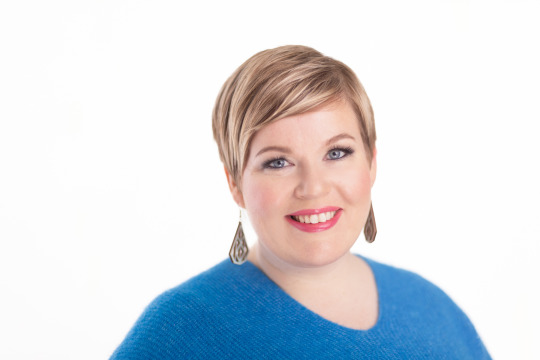
View On WordPress
0 notes
Text
Minister of Finance Annika Saarikko said that she will evaluate her position as chairman of the center this spring.
0 notes
Text
"WHAT?" 😳😂
(Article in today's paper, featuring smthg that happened on a TV show last night. For background info: Susanna Laine is a Finnish TV host/actress/former Miss Finland runner-up from 2005. Scroll down for translation. 😉)


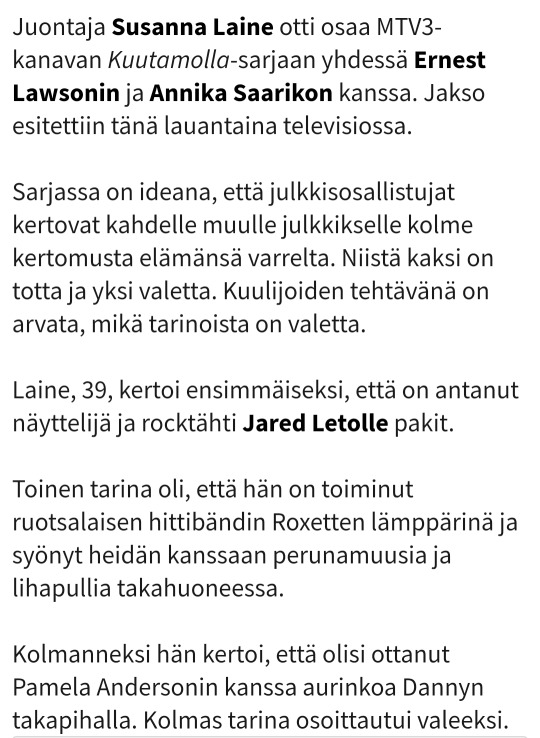

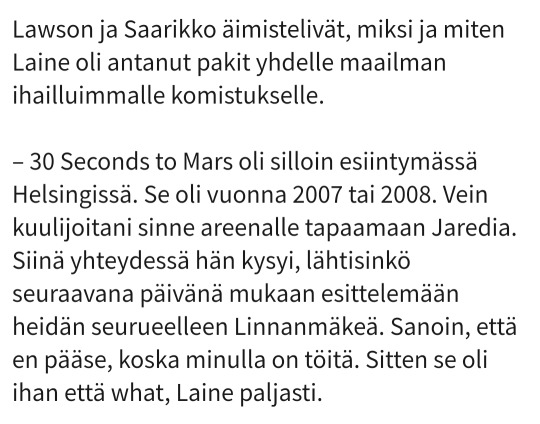
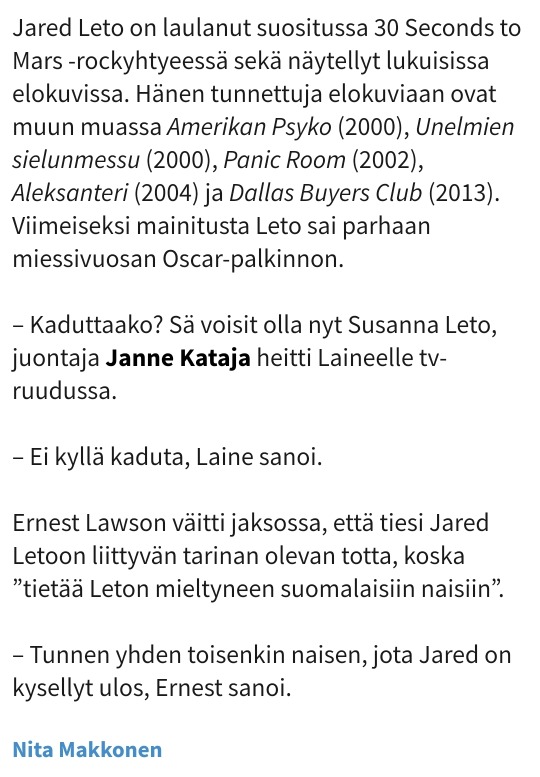
SUSANNA LAINE TELLS OF HER UNBELIEVABLE MEETING WITH AN OSCAR-WINNING ACTOR: STAR ASKED TO BE HIS DATE, BUT LAINE REFUSED
Laine took part in the TV show "Kuutamolla" alongside Ernest Lawson and Annika Saarikko.
The idea of the show is that a celebrity guest tells two other celebrity guests 3 stories from their lives. 2 stories are true, and 1 is a lie. The listeners then have to figure out which story is a lie. 🤔
Laine, 39, first told that she had once turned down actor and rockstar Jared Leto.
Second story was that she was once the opening act for the Swedish hit band Roxette and ate mashed potatoes and meatballs with them backstage.
Third she told that she once sunbathed with Pamela Anderson in Danny's backyard.
(Side note: Danny = Old, OLD, Finnish pop singer. 👴)
The third story was revealed to be a lie.
Lawson and Saarikko were stunned why and how Laine blew off one of the world's most admired hunks.
"30 Seconds to Mars were performing in Helsinki. This was in 2007 or 2008. I took my listeners to meet him at the arena."
(Side note: couple of pics from that time period for visual effect and context. 👇)
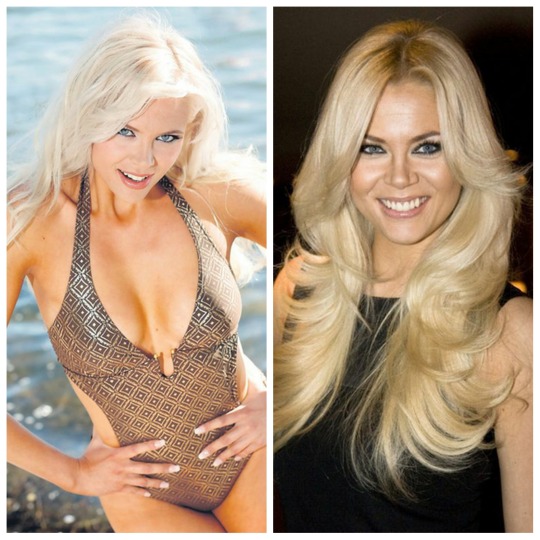
"He then asked me if I would join their entourage the next day to show them around Linnanmäki."
(Side note: Linnanmäki = amusement park. 🎢🎡)
"I said I can't because I have work. Then he was like "what?", Laine revealed.
(Side note: Leave it to Mr. Professional to be gobsmacked when someone DOESN'T blow off work obligations just cos he bats his pretty pretty blue eyes... 😂😱)
"Do you regret it? You could now be Susanna Leto", show host Janne Kataja asked.
"No I don't regret it", Laine replied.
Ernest Lawson claimed in the show that he knew the story involving Jared Leto was true, because "I know Leto has a thing for Finnish women".
"I know one other lady that Leto asked out", Ernest said.
😂😂😂😂😂😂😂😂😂😂😂😂😂😂😂😂😂
WHO THO, ERNEST? 😑🤔
1 note
·
View note
Text
Uskomushoito-sana on suomalaisen lääkärin keksimä pilkkanimi
Uskomushoito-sana on suomalaisen lääkärin keksimä pilkkanimi
Kirjoittaja: Jouni Jämsä
Etelä-Suomen Sanomissa 10.2. oli Annika Saarikon haastattelu puoskarilaista. Kaikkia suomalaisia edustava ministeri käytti jutussa nimitystä “uskomushoito”.
Uskomushoito-sana on pilkkanimi
Uskomushoito-sana on suomalaisen lääkärin keksimä pilkkanimiheidän koulutuksestaan poikkeaville hoidoille, ja sitä nimitystä käytetään vain Suomessa. Tämmöinen julkinen nimittely on…
View On WordPress
#Annika Saarikko#CAM-hoidot#hoito#hoitovirhe#Jouni Jämsä#lääkäri#perustuslaki#puoskarilaki#täydentävät hoidot#uskomushoito#vaihtoehto
0 notes
Text
Finlandiya el koyulan Bitcoin'lerin parasını Ukrayna'ya bağışlayacak
Finlandiya el koyulan Bitcoin’lerin parasını Ukrayna’ya bağışlayacak
Finlandiya, kolluk kuvvetleri tarafından ele geçirilen Bitcoin’lerin Ukrayna’ya satışından “on milyonlarca” avro bağışlayacak.
Finlandiya Maliye Bakanı Annika Saarikko, Çarşamba günü Rusya’nın işgal ettiği Ukrayna’ya yapılan bağış haberini paylaştı. cıvıldamak Euronews’in haberine göre Saarikko şunları söyledi:
“Hükümet, ele geçirilen Bitcoin’lerin satışından Finlandiya Gümrük İdaresinin…

View On WordPress
0 notes
Text
Finland Shall Be Selling €75 million Worth of Confiscated Bitcoins to Support Ukraine
Finland Shall Be Selling €75 million Worth of Confiscated Bitcoins to Support Ukraine
Ever since Russia announced its invasion of Ukraine, the invaded country has been receiving strong donations in crypto to fund its war effort. Joining recently is the Nordic country of Finland which has vowed to donate “tens of millions” of Euros earned through the sale of confiscated Bitcoins.
Finland’s finance minister Annika Saarikko tweeted the same on Wednesday, April 27. The translated…

View On WordPress
0 notes
Text
New Post has been published on Vivan Life Sciences
New Post has been published on https://www.blog.vivanls.com/india-being-considered-as-the-centre-stage-for-biopharmaceuticals/
India being considered as the centre stage for biopharmaceuticals !

Global Innovation Alliances (GIA) members countries of UK, Australia, Denmark, Sweden, Switzerland, Netherlands among others noted that India cannot be ignored for biopharmaceuticals as clinical trials and vaccine take centre-stage.
Stating that India is being considered for clinical trials and manufacture of active pharmaceutical ingredients (API) and for vaccine trials, besides healthcare in general and regulatory, said GIA members.
At the run up to the Bengaluru Tech Summit 2020 which will be held virtually for the first time from November 19 to 21, 2020. Karnataka government has embarked on developing Global Innovation Alliances with innovation hubs of the world, through which there are on going engagements with over 20 countries on a regular basis. The engagements range from G2G meetings and MoUs, to active projects for skilling, R&D and start-up cooperation. Partner countries like Australia, France, Germany, Israel, Netherlands , Switzerland and UK, among others, will play a key role in showcasing advancements made in technology and how future ready their innovations are through the GIA sessions platform.
The three day event will also have a dedicated track for GIA sessions for facilitating international partnerships. Countries will host technology sessions for ecosystem connects, exchange of ideas and people, and deliberations on policy environment.
Minister level delegations from key GIA partner countries are expected throughout the three-day Summit. Annika Saarikko, Minister of Science and Culture, Finland; Karen Andrews, Minister for Industry, Science and Technology, Australia; Tariq Ahmad, Minister for South Asia and the Commonwealth, UK; Prof. Andreas Pinkwart, Minister of Economic Affairs, Innovation, Digitalization and Energy of the Federal State of North Rhine-Westphalia, Germany who will be addressing the virtual gathering.
The 23rd edition of Bengaluru Tech Summit will be inaugurated by Prime Minister Narendra Modi, d more than 40,000 visitors. It will also witness international technology experts who will be part of panel discussions and also participate as keynote speakers across all the tracks.
This year, Karnataka is expected to sign over 7 MoUs with GIA partner institutions for cooperation in startups, research & development and skilling, out of which 7 will be signed at Bengaluru Tech Summit. The MoU will also chart deliverables regarding mentorship connects and mutual industry facilitation. Department of Electronics IT Bt and S&T and the Department of Commerce and Industry have jointly decided to sign an MoU with Indiana Economic Development to work on projects in electric vehicles and medical devices/healthcare. The MoU will be signed for a period of 5 years.
They are now working at global level, through exchange of people and ideas, so that Karnataka may consistently maintain its lead position in innovation, science and technology.
Reference: Pharmabiz
0 notes
Text
COPENHAGEN, Denmark (AP) — The NATO military alliance warned Thursday it would retaliate for any attacks on the critical infrastructure of its 30 member countries and joined other Western officials in citing sabotage as the likely cause of damage to two natural gas pipelines in the Baltic Sea.
The warning came as the Swedish coast guard confirmed a fourth leak on the pipelines off southern Sweden, which is in the process of joining NATO. The first leaks in the pipelines that extend from Russia to Germany were reported on Tuesday, prompting energy companies and European governments to beef up security.
The fear of further damage to Europe’s energy infrastructure has added pressure on natural gas prices, which had already been soaring. Russia, a major supplier to Europe, cut off deliveries earlier this year in retaliation for sanctions imposed after its invasion of Ukraine. That has caused widespread economic pain across the continent.
NATO ambassadors said in a statement that “any deliberate attack against allies’ critical infrastructure would be met with a united and determined response.” They refrained from saying who they thought was responsible, even though some allies like Poland, and many experts, have said they believe that Russia is responsible.
“All currently available information indicates that this is the result of deliberate, reckless, and irresponsible acts of sabotage. These leaks are causing risks to shipping and substantial environmental damage,” the envoys said.
The rising tensions around energy security in Europe come as Russia prepares to annex four regions of occupied Ukraine, a move widely condemned by the West. Russian energy giant Gazprom heightened uncertainty around energy supplies Wednesday by threatening on Twitter to cease dealing with a Ukrainian company that controls one of the two remaining pipelines that ship Russian gas to Europe.
Rather than assigning blame to anyone specific, EU officials on Thursday said they would await the outcome of an investigation, which probably will not start in earnest until next week once the undersea pipelines are empty.
The two lines between Russia and Germany were not in operation. But they were filled with tons of methane, a major cause of global warming that is being emitted into the atmosphere and will continue to bubble to the Baltic Sea’s surface, probably until Sunday, according to energy experts.
Danish Defense Minister Morten Bødskov turned to Twitter to call the NATO statement a “joint condemnation and very strong signal from the alliance.” But NATO has made many statements of resolve to defend its members and their territory since Russia invaded Ukraine in February.
Two of the leaks are on the Nord Stream 1 pipeline that Russia recently turned off as it ramped up energy pressure on Europe. The other two are on Nord Stream 2, which has never been used. The Danish and Swedish governments have said that they believe the leaks were “deliberate actions.”
According to seismologists, the leaks were preceded by explosions. A first explosion was recorded early Monday southeast of the Danish island of Bornholm. A second, stronger blast northeast of the island that night was equivalent to a magnitude-2.3 earthquake. Seismic stations in Denmark, Norway and Finland also registered the explosions.
Speaking Wednesday before the fourth leak was reported, Swedish Prime Minister Magdalena Andersson said it would have taken a large explosive device to cause the damage.
Norway was among the first countries on Wednesday to beef up the protection of its energy installations. Finnish Finance Minister Annika Saarikko said Thursday that security measures have been tightened around the Balticconnector line running in the Baltic Sea between Finland and Estonia.
“Very exceptional and serious actions that point to sabotage give reason to intensify our preparations,” Saarikko told reporters.
In Moscow, Kremlin spokesman Dmitry Peskov said Thursday that the Nord Stream pipeline incident would have been impossible without a state actor’s involvement.
“It looks like a terror attack, probably conducted on a state level,” Peskov said in a conference call with reporters.
He dismissed media reports about Russian warships spotted in the area as “stupid and biased,” adding that “many more aircraft and vessels belonging to NATO countries have been spotted in the area.”
The U.N. Security Council has scheduled an emergency meeting Friday afternoon at Russia’s request to discuss the suspected pipeline sabotage.
Torben Ørting Jørgensen, a former admiral with the Danish navy, told The Associated Press that it was “not so demanding” to carry out an operation either by using a remotely operated underwater vehicle or sending divers from a submarine or a surface vessel.
“Those who carried out the operation knew they wouldn’t get caught,” Ørting Jørgensen said. “Who would have thought of an operation against pipelines in the Baltic Sea?”
7 notes
·
View notes
Text
:NIMITYKSET: Keskustan ministeriryhmä: Reina ja Kemell Keskustan valtiosihteereiksi
Timo Reina ja Ann-Mari Kemell
Valtiovarainministeri Annika Saarikko on kutsunut valtiosihteerikseen varatuomari Timo Reinan. Reina toimii tällä hetkellä Kuntaliiton varatoimitusjohtajana ja on toimivapaalla Kuntaliitosta valtiosihteerin tehtävää hoitaessaan. Hän on aiemmin toiminut mm. Hämeen maakuntajohtajana ja kuntaministerin valtiosihteerinä. Reina aloittaa valtiovarainministerin…
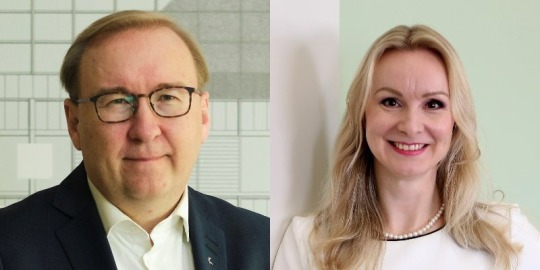
View On WordPress
0 notes
Text
The Minister of Finance and the chairperson of the Center Annika Saarikko dismissed the rumors about Minister of Economy Mika Lintilä's alcohol consumption as "brutal and anonymou...
0 notes
Text
Finnish Centre Party board member lambastes Saarikko's statement on NATO membership
Finnish Centre Party leader, Finance Minister Annika Saarikko, has come under harsh criticism from Harriet Lonka, member of the party's board. In an opinion article published in the Centre Party's newspaper, Suomenmaa, Lonka said Saarikko's recent statement on Finnish security policy was a lamentable attempt to silence debate on Finland's possible membership of NATO. She said Saarikko used her authority to deplore the fact that potential NATO membership was now being discussed. "Many of us think that the current situation calls for such a debate, and it is more than unfortunate that Saarikko cultivates half-truths and spreads imaginary ideas," Lonka writes. "It is not wise to reduce such a key security and defence policy issue – strengthening our military defence capabilities, possibly together with allies, – to inter-party squabbling," she states. Saarikko's idea that "NATO membership would somehow be an alternative to Finland's current national defence, based on universal conscription and a large military reserve, is wrong," Lonka insists. Moreover, NATO membership is not an alternative to taking part in developing common EU defence policy, she adds. "Finland is a small and valiant nation worthy of all our love and loyalty; it would be no less so as a member of NATO," Lonka concludes.
0 notes
Text
Finland is too white to solve its issues with racism. There must be change.
Finland is too white to solve its issues with racism. There must be change.
After the bombshell news that one of the suspects arrested Friday who brutally attacked Pekka Kataja of the Perussuomalaiset (PS) in July, the new chairperson of the Center Party, Annika Saarikko, said on Ykkösaamu Saturday that she could form a government with the PS.
In light of the PS’ links with far-right groups, Saarikko’s response was inopportune and ill-timed.
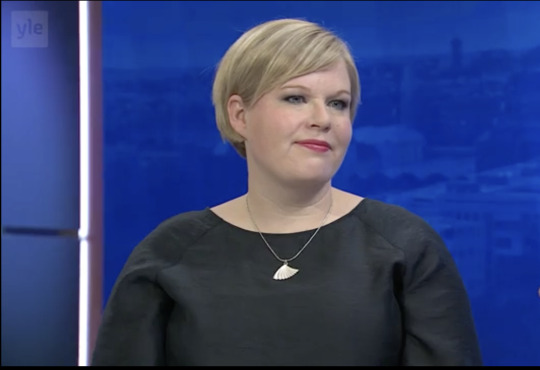
Center Party…
View On WordPress
0 notes